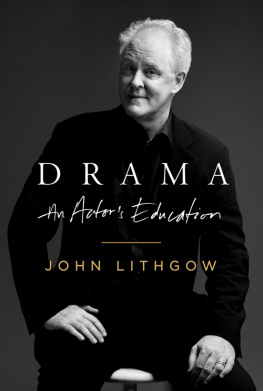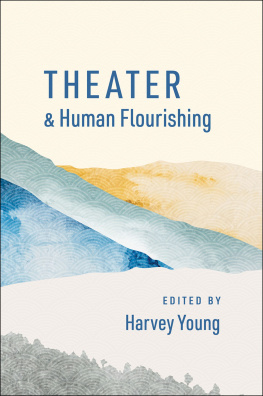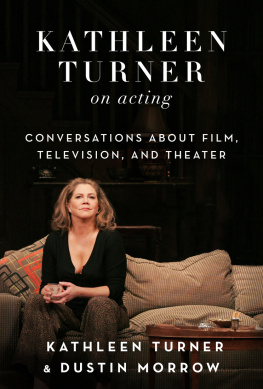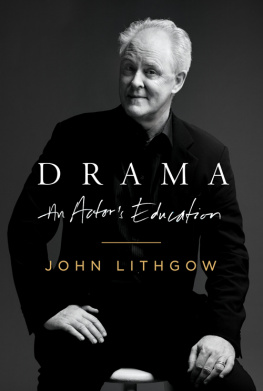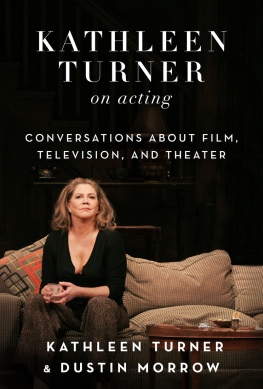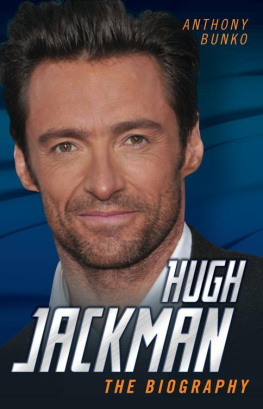DRAMA
An Actors Education
John Lithgow

To Mary
Contents
A Curious Life
A Kiss on the Neck
Lachryphobia
The Good Boy
Enter Messenger
The Beefeater
Most Creative
Big and Little
Curtains
Pinch Me
Veritas
Utopia
Hard Times on the Great Road
Three Lincolns
This Scepterd Isle
D Group Days
Getting Out
Coming Home
The Triumph of Nepotism
Much Ado
Reality
Induced Insecurity
A Fork in the Road
Naked
Mr. Pleasant
Broadway Baby
Adolescence
My Biggest Mistake
I n the summer of 2002, my father was eighty-six years old. Hed been the picture of health all his life, but that summer he started to have some serious medical problems. There was an operation that could address these problems, but his doctors wanted to avoid it if at all possible. The operation involved major abdominal surgery, and they were afraid that it might be too much for an old mans system. But finally there was no choice. His health was plummeting and his doctors decided that, to save him, they would have to operate. So a date was set, and on the morning he went into surgery, the family was told that he had only a fifty-percent chance of surviving it. These were scary words, of course. But in fact he did survive it, and we all breathed a huge, collective sigh of relief.
But by the time he was discharged from the hospital, we had started to worry all over again. The operation had taken its toll. It had weakened him terribly and had drastically slowed him down. Worst of all, it had taken away his spirit. This genial man, with his impish humor and his boisterous laugh, fell silent and plunged into a deep depression. It didnt help that he and my eighty-four-year-old mother lived alone, with nobody looking after them. For years my brother, my two sisters, and I had repeatedly offered to set them up in a retirement community, but they had refused to even consider it. Instead they had ended up in a condo of their own choosing, outside of Amherst, Massachusetts, living like a little old couple in a cabin in the woods in a Grimms fairy tale. And when my mother drove my father home from the hospital, thats where she took him.
There they were: my father struggling to convalesce, my mother struggling to take care of himand she wasnt in such great shape, either. It was a catastrophe. Something had to be done.
Of us four siblings, I was the only one out of work. I had time on my hands. So with my wifes encouragement, I dropped everything, flew across the country, and moved in with my parents. My task was simple. I would tend to my father, help out my mother, organize Dads postoperative therapies, and figure out some system of ongoing care for both of them. The plan was for me to stay with them for exactly one month and have everything nicely in order by the time I left. I can do this, I thought. Itll be easy.
It wasnt. The first few days I was there, I practically fell apart. The situation was far worse than I had expected. I saw immediately that I was going to have to take care of my father, a frail old man, as if he were a little baby. He was too weak to sit up in bed. He was tormented by bedsores and a babys burning diaper rash. He couldnt stand or walk without help. He couldnt get to the dining room table, let alone manage a bathtub, a shower, or a toilet. Worst of all, he had been sent home from the hospital with terse instructions to painstakingly change his own catheter, reinserting it every day, and to keep careful, written records of the workings of his own internal plumbingat eighty-six years old! It was my job to help him through all of this, and I didnt know what I was doing. I was in way over my head, it was exhausting work, and it was unbearably sad. Every night I would get on the phone to my wife, back home in Los Angeles, and just sob.
The days passed and things improved. But they didnt improve much. My mother, my father, and I gradually fell into a predictable routine. I fixed their meals. I took Dad on short, halting constitutional walks. I bathed him, powdered him, and got rid of that awful rash. Hed gotten shabby and unkempt, so I trimmed his nails, shaved his stubbly beard, and cut his stringy hair. I prodded him to tell sunny stories of his early days and his young years with my mom. I coaxed him into word games and crosswords. I stumped him with scraps of Shakespearean triviaanything, anything to cheer him up. But nothing worked. He made listless, halfhearted attempts to indulge me and my strenuous diversions, but nothing dispelled his feelings of gloom and doom. He felt tired and forgotten. He felt his life wasted and misspent. Hed lost his will to live. Without it, he was clearly not going to last much longer. I felt as if my mother and I were helplessly monitoring the slow decline of an old man who had just given up.
Then one day, halfway through my time with them, I had an idea. It was an idea that bubbled up through the soft-focus haze of my childhood, fifty years before. It was one of the best ideas I ever had.
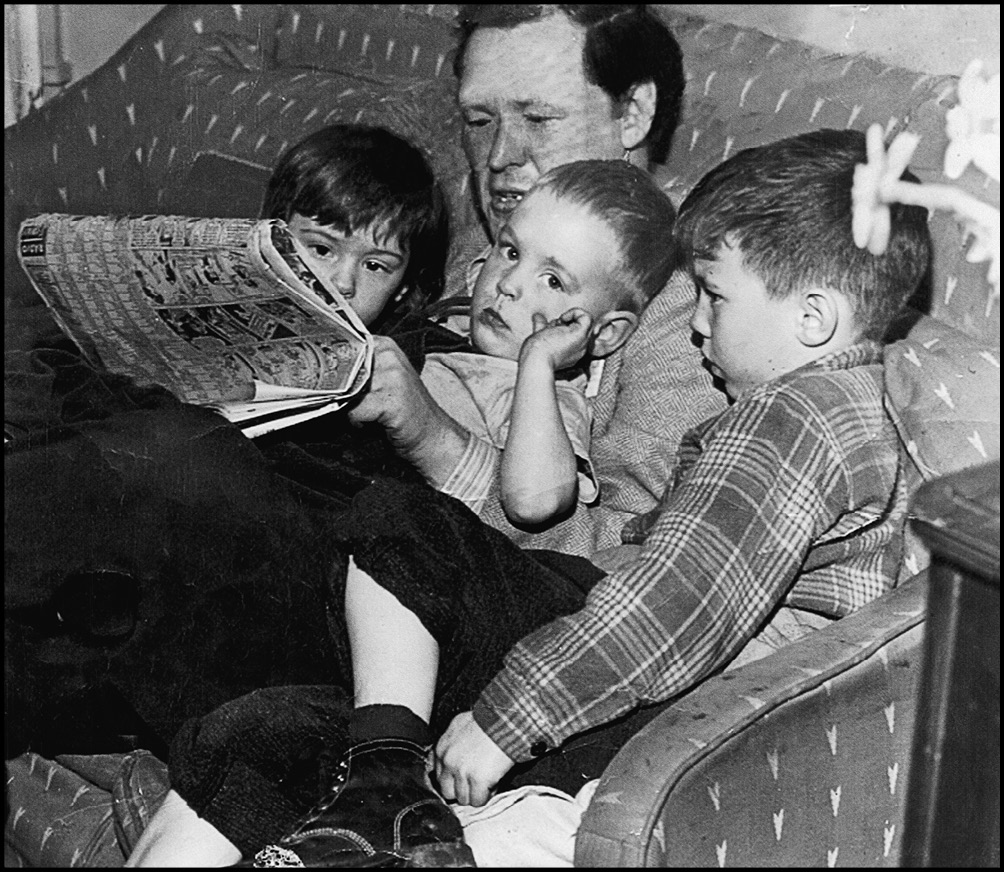
In my grade-school years, my family moved a lot. There was an old burnt-orange sofa that traveled with us everywhere we went. That humble piece of furniture figures in some of the fondest memories of my youth. It was where I first heard stories. My siblings and I would cuddle up to my father on that sofa at bedtime and he would read to us. He read the comics in the newspaper with near religious regularity. He read Kiplings The Jungle Book , a chapter a night. He read Dickens A Christmas Carol every year on Christmas Eve. He read doggerel poems by Edward Lear, Lewis Carroll, and Ogden Nash from a set of bright-orange volumes called Childcraft . For all four of us, our most intimate memories of our fatherhis crinkly smile, his plummy voice, his husky smell, and his short-sleeved seersucker shirtsare connected to those lazy, luxurious evening hours on that scratchy wool sofa, all of us on the verge of sleep.
Most memorably, he read to us from a fat book called Tellers of Tales . This was a fifteen-hundred-page tome, edited by W. Somerset Maugham, that contained a hundred classic short stories. The book had been printed in 1939. By the fifties our copy was already faded and worn, its pages yellowing. Its spine was sprung, too, but my father had craftily repaired it with crimson-colored duct tape. He had even taken pains to neatly write its title in white ink on the taped spine. Characteristically, he had written it upside down by mistake.
When we were growing up, that homely old book was a kind of family Bible in the Lithgow household (wherever that household happened to be at the time), and story hour had all the gravity of a sacred rite. We would pick a story and my father would read itsavoring the wit, ramping up the suspense, and performing all the characters full-out. He worked a kind of hypnotic magic on us. We would hold our breath at the hair-raising suspense of The Monkeys Paw. We would sniffle and sob when Krambambuli, the loyal Alsatian mountain dog, died of a broken heart. For the first time we heard the words of Ernest Hemingway, F. Scott Fitzgerald, Arthur Conan Doyle, Edgar Allan Poe, Jack London, Dorothy Parker, and on and on and on.
Did we have an all-time favorite? Oh yes. It was the funny one. It was called Uncle Fred Flits By, by P. G. Wodehouse. This one was something special. Over the years I forgot most of the details of this story. Its plot and its settings all became a blur. But I remembered Pongo. I remembered the pink chap. I remembered something about a parrot. And I remembered the outrageous Uncle Fred and his crackpot schemes, especially as portrayed by my father, a man with an abundant history of crackpot schemes of his own. Mainly I remembered how flat-out hilarious the story was. When we were growing up, any mention of the pink chap was enough to send everyone into fits of laughter, long after Id forgotten who the hell the pink chap even was.
Next page
